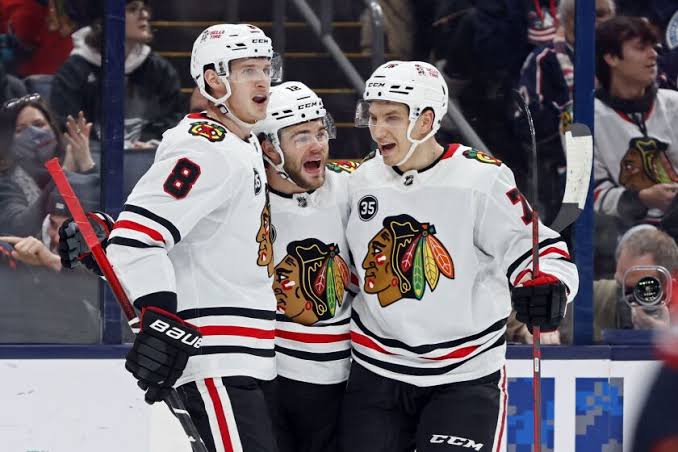- The Chicago Blackhawks: A Legacy of Excellence and Resilience
The Chicago Blackhawks are one of the most storied and successful franchises in the history of the National Hockey League (NHL). Founded in 1926 as one of the “Original Six” teams, the Blackhawks have built a legacy that stretches across nearly a century, marked by incredible players, memorable moments, and a passionate fanbase. Chicago’s hockey team is not just a part of the city’s identity; it’s woven into the fabric of its history.
The Early Years: Establishing a Legacy
The Chicago Blackhawks were founded by the team’s first owner, Frederic McLaughlin, who brought professional hockey to Chicago in 1926. The team was named after the Black Hawk Division of the United States Army during World War I, a tribute to the Native American leader Black Hawk, who was an important figure in Illinois’ history. The franchise was an immediate success, joining the NHL as one of its founding teams.
Throughout the early years, the Blackhawks had varying degrees of success, but it wasn’t until the late 1930s and early 1940s that they began to build their reputation. In 1938, the team won its first Stanley Cup, a significant achievement that set the tone for future success.
The Golden Era: The 1960s
The 1960s are considered a golden era for the Chicago Blackhawks, as they enjoyed some of the best hockey of their history. The team was led by Hall of Famers such as Bobby Hull and Stan Mikita, who were pivotal to the team’s rise to prominence. Bobby Hull, often referred to as “The Golden Jet,” was one of the greatest goal scorers in hockey history, and Stan Mikita was known for his skill, vision, and leadership on the ice.
The Blackhawks captured another Stanley Cup in 1961, defeating the Detroit Red Wings in a thrilling five-game series. That victory was the franchise’s third Cup win and came at a time when the Blackhawks were one of the most dominant teams in the league.
While the Blackhawks would not capture another championship in the 1960s, the foundation for success was laid, with Hull and Mikita becoming icons of the game and continuing to shape the team’s culture.
The Dark Years and Rebuilding
Following their success in the 1960s, the Blackhawks struggled to find consistent success throughout the 1970s and 1980s. Despite some competitive seasons, the team struggled to capture the elusive Stanley Cup. Fans experienced frustration as the team failed to reach the heights of their earlier years, but the Blackhawks continued to remain an important part of Chicago’s sports landscape.
The 1990s offered some hope as the Blackhawks made several playoff appearances and were led by players such as Jeremy Roenick and Chris Chelios, but the elusive Stanley Cup still remained out of reach. The team seemed stuck in mediocrity, leaving the city’s hockey fans yearning for a championship contender.
The Renaissance: 2010s and the Dynasty Years
In the 2000s, the Chicago Blackhawks began a new chapter, one that would define the franchise for the next decade. With a mix of youth, skill, and leadership, the team underwent a renaissance under head coach Joel Quenneville. The Blackhawks’ roster began to feature rising stars such as Jonathan Toews, Patrick Kane, Duncan Keith, and Brent Seabrook—key figures who would lead the franchise to greatness.
The Blackhawks’ resurgence culminated in a series of dominant seasons, with the team capturing three Stanley Cups in six years—2010, 2013, and 2015. The 2010 championship was especially sweet, as it ended a 49-year title drought for the Blackhawks and made them the first team to win the Cup in a decade.
Jonathan Toews, the team’s captain, emerged as a clutch leader, while Patrick Kane’s offensive brilliance and playmaking abilities earned him widespread acclaim. The 2013 victory, in particular, was a defining moment for the Blackhawks, with their dramatic Game 6 win over the Boston Bruins in the Stanley Cup Final becoming one of the most iconic moments in hockey history.
The Modern Era: Transition and Rebuilding
After the 2015 Cup victory, the Blackhawks entered a phase of transition. Aging veterans and salary cap restrictions led to a period of rebuilding, but the core group of players like Toews, Kane, and Keith remained. The team continued to be competitive, though they faced challenges in maintaining their championship-caliber status.
As of the mid-2020s, the Blackhawks are in the midst of a rebuild. With a focus on developing young talent, the team has leaned into its future, investing in prospects and aiming to develop the next wave of stars who can restore the Blackhawks to their former glory.
A Fanbase Like No Other
The Chicago Blackhawks are deeply intertwined with the city’s sports culture. Their fans, known for their unwavering loyalty and passion, pack the United Center for every home game, creating an electric atmosphere that resonates throughout the NHL. The “Hawk Nation” has become one of the most dedicated fanbases in all of professional sports, and they proudly support their team through thick and thin.
The team’s iconic anthem, “Chelsea Dagger” by The Fratellis, has become synonymous with Blackhawks games, and the tradition of the crowd singing along after each goal is an unforgettable part of the game-day experience.
Conclusion
The Chicago Blackhawks are more than just a hockey team; they are a part of the cultural and sports fabric of the city of Chicago. Through highs and lows, from their early Stanley Cup victories to their more recent successes, the Blackhawks’ legacy is one of pride, resilience, and passion. As the team looks toward the future with a new generation of talent, there’s no doubt that the Blackhawks’ journey will continue to be one of the most exciting and enduring stories in the NHL. Whether they are lifting another Stanley Cup or building for the next great era, the Blackhawks will always be a team to watch.

